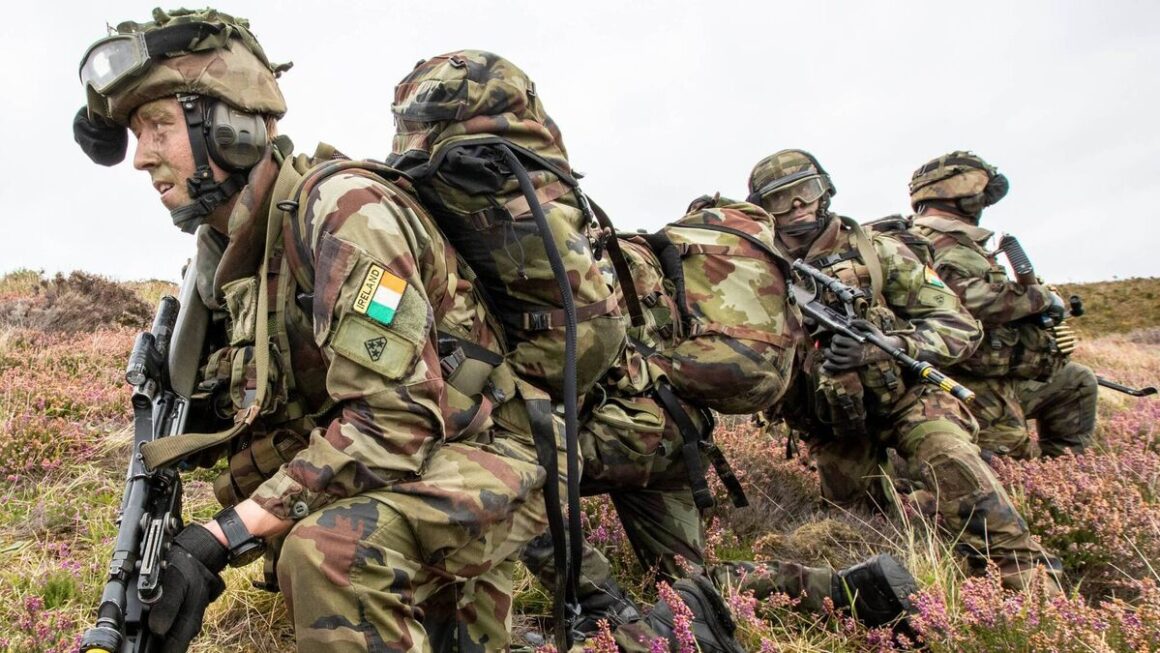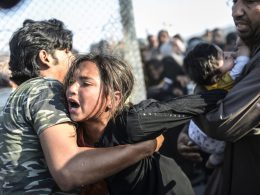By Finghín Kelly
The last month has seen a concerted effort from large sections of the political establishment – in particular those in Fine Gael and several prominent journalists – to push for a formal abandonment of the Irish state’s position of ‘military neutrality’.
There has been a slew of calls for “debates”, “rethinks” and “mature reflection” about Ireland’s involvement in military alliances and blocs.Leo Varadkar has called for the “need to think deeper about European defence” and Micheál Martin has called for a Citizens’ Assembly to look at the issue. The Greens have endorsed the government position, including even lining up to shamefully vote against a proposal to have a referendum to put military neutrality into the state’s constitution.
The drive for a European army
These calls come in the context of a concerted push from the major powers in the EU, and in particular the French and German governments – to further militarise the EU. This is not a new development. A commitment to a common EU defence policy and to “progressively to improve their military capabilities” was included in the Lisbon Treaty over a decade ago.
This militarisation push has received a renewed boost in recent years. We’ve seen the establishment of PESCO which commits EU states to jacking up military spending to 2% of GDP.
French President Macron has followed his call for a “True European Army” with a special summit in Versailles in March that saw a commitment to set up a 5,000 strong “Rapid Reaction Force” under the auspices of the EU’s Common Defence policy. We have also seen the tripling of Germany’s defence spending in recent weeks.
Imperialist blocs
The motivation here is the desire to back up the EU’s economic block with a military weight. As former Taoiseach John Bruton put it, “You cannot create a political union and then say you are not prepared to defend it. That is logical.”
The truth is that these military forces would be deployed not to prevent human rights abuses or to protect the sovereignty of weaker states, but to keep markets open and access to raw materials for European corporations, and to generally act in the interests of the European capitalist powers.
This is very much linked with the increased inter-imperialist tensions globally which are putting European capitalist powers in sharper competition with other blocs globally. European powers recognise that they can and will have different interests to US and British imperialism, therefore want to develop capabilities more independent of NATO.
Increased military spending
There is a cynical attempt to use the fear and concerns over Ukraine to soften up public opinion here and in other countries. But the push for Irish involvement in such a militarisation is not new.
Prior to the war in Ukraine, the publication of a Commission on Defence Forces Report recommended massive increases in military spending, including potentially bringing the defence budget up to €3 billion a year. Envisaged in this plan is the Irish state investing in a squadron of combat aircraft which would cost approximately the same as building 8,000 homes or providing over 4,000 hospital beds!
It is likely that the government will go for an increase in spending on a lesser scale, but it will be an increase with the goal of the state’s army being able to integrate into other EU armies and to participate in missions to back up the interests of the major European powers, as we have seen in Mali. Here, the Irish army has played a supporting role for French troops who have been engaged in active combat against opponents of a regime that was friendly to French imperialism. Irish troops have also been engaged in training up the Malian army, an army that has a well-documented record of human rights abuses, last year opened fire on demonstrators and staged a coup d’etat.
Ireland’s progressive history?
Some on the left, such as PBP TDs, have pointed to the Irish state as having had a progressive foreign policy over the years. For example, Gino Kenny TD argued in the Dáil that:
“Ireland has a proud history of neutrality, going back centuries…. Ireland’s reputation across the world is second to none with regard to social justice, peacekeeping and standing up for the oppressed across the world. We should know, because Ireland has a proud history of standing up to oppression, imperialism and the terrible effects of war.” (Dáil Éireann, 30 March 2022)
Richard Boyd Barrett TD even went as far as to say that the reason for military neutrality lies in those who founded the state being progressive.
“[a policy of military neutrality] is certainly in line with the traditions of James Connolly, who helped to found this State, and of Wolfe Tone. It is in line with the tradition that established this State, in opposition to the slaughter of the First World War and the colonial domination of the British Empire.” (Dáil Éireann, 30 March 2022)
The founders of the state were not socialists or progressives, but the forerunners of Fine Gael and Fianna Fáil. The Southern state was founded in the teeth of a vicious counter-revolution – an active intervention by British imperialism and the Irish capitalist class to cut across the revolutionary movements in Ireland in the 1917-1923 period. This state can claim no heritage to socialists like James Connolly, or the anti-imperialist struggles waged by working people over the course of centuries.
Indeed, as Connolly explained in his work Labour in Irish History: “[The Irish capitalist class] have now also bowed the knee to Baal, and have a thousand economic strings in the shape of investments binding them to English capitalism as against every sentimental or historic attachment drawing them toward Irish patriotism; only the Irish working class remain as the incorruptible inheritors of the fight for freedom in Ireland.”
This subservience and ultimate support for imperialism was reflected in the foreign policy of the Irish state.
The limits of Irish neutrality
The reality is that the Irish state’s neutrality was always something of a fiction. The state was always a supporter of Western imperialism, and in particular US imperialism throughout its existence.
Irish airspace and ports have always been made available to Western imperialist forces en route to conflict. This is graphically shown by Shannon airport, where an estimated 2.5 million US troops have passed through on the way to Iraq and Afghanistan. The airport has also been used for so-called ‘rendition flights’, which involved secret abductions of suspects.
This being said, the capitalist class in Ireland have had to be cognisant of widespread opposition to militarism. The legacy of the anti-imperialist movement against the presence of the British army in Ireland, which saw a general strike against conscription in 1918, left an impact. Those who ruled after 1922 were not free to act in outright support for imperialist war as the Irish ruling class did prior to these movements when they were willing participants and even recruitment sergeants for British imperialism.
Keeping the establishment in check
The position of neutrality therefore was more a reflection of this need to take the consciousness of working-class people into account rather than any kind of progressive sentiment on the part of the political establishment.
This is evidenced in the regular attempts to push back this sentiment, including the recent hype around the brutal invasion of Ukraine. But in the last 20 years or so, Fine Gael in particular has been vocal in pushing for a military policy aligned with imperialism, publishing a paper in 2003 titled ‘Beyond Neutrality’ for example. It is no coincidence that this came the year that US imperialism, backed by the Blair government in Britain, launched its bloody invasion of Iraq.
Despite these pushes by sections of the ruling class, support for ‘neutrality’ – which in reality is understood in the Irish context as an opposition to war and militarism – remains strong. A recent Red C poll showed that 69% support this policy. This is a progressive sentiment and something that the Socialist Party fully supports. We oppose all capitalist and imperialist military alliances, stand for the disbandment of NATO and oppose any attempt to make Ireland a more militarized state.
What’s needed
We do not support, however, an insular foreign policy. Socialists are internationalists and have a complete opposition to imperialism, exploitation and oppression throughout the world. We live in a world that is defined by the struggle between the oppressors and the oppressed, the exploiters and the exploited. We are in no way neutral in that struggle.
For example, we actively support the resistance of workers against repressive states from China to Egypt to Brazil, we support the waves of feminist, anti-racist and environmental protest and fight the against the forces of the far-right globally. We support the struggle of the Palestinian people and all struggles against colonialism and oppression. We also defend the right of people to take up arms when faced with military occupation.
We stand for the coming to power of a socialist government based on the rule of the working class in Ireland, whose foreign policy is committed to this internationalist outlook. It would reach out and appeal to working class, poor and oppressed people across our planet to join their siblings here in Ireland in a common struggle against the rule of capitalism and imperialism. It would stand for a vision of a truly democratic and socialist world, based on real solidarity, equality and peace.












